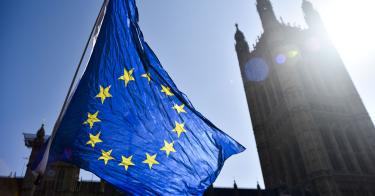In the NCAA basketball tournament, all but one team lose. In Britain, as the House of Commons votes and votes again on Brexit, having even one winner would be a novelty. The difference is that on the basketball court, unlike in Britain, the competition isn’t between illusions.
On Wednesday, the Commons voted on eight ways to manage Brexit, from exiting the European Union without a deal to holding a new referendum. Every option lost. Prime Minister Theresa May’s plan wasn’t up for a vote, but the Commons has turned her option down twice. On Friday, members turned it down again.
May’s deal is predicated on keeping Britain and the EU in a customs union for goods only until they come up with another plan. Purportedly, this is to prevent the creation of a hard border between Ireland, which would be in the EU, and Northern Ireland, part of the U.K.
That rationale has never looked worse. The EU’s chief Brexit negotiator has reportedly told the European Parliament, “In the case of no deal ... there will be no hard border.”
There are many ways to manage cross-border trade — such as a system based on the technology that powers E-ZPass. The Irish border problem has always been a convenient myth.
The true driver behind May’s deal is that the EU wants to ensure Britain keeps on taking its rules from Brussels. It has no incentive to negotiate anything to replace May’s deal, and it will simply refuse to do so. From the EU’s perspective, that makes a lot of sense. But what about May’s? On the British side, the advantage of a customs union in goods is that it maintains the status quo of British exports to the EU. This isn’t a status quo that has done a lot for British exporters: U.K. exports to the continent have stagnated over the past 20 years.
Indeed, the British economy is dominated by services. Fully 80 percent of the business Britain does is invisible goods — services — not visible ones. You might expect that Britain’s goal in negotiating its exit from the EU would be to stand up for its service industries.
But instead, May’s deal, like the debate over Brexit, focuses on visible goods. Britain’s vested manufacturing interests are powerful, as is the threat of layoffs in the industrial north of Britain. These cities voted for Brexit. They also are cities that May’s Conservative Party needs to win.
The result: a deal that tries to split the difference between leaving the EU and satisfying manufacturing exporters, but which, by failing to be Brexit in anything but name, satisfies almost no one.
The opposition Labour Party is no better. It dominates liberal, cosmopolitan London, where the rich opposed Brexit — but it can’t win without the Brexit-backing north. The result: a policy of refusing to have a policy, and a laserlike focus on blaming the Conservatives.
This isn’t a dilemma unique to Britain. President Donald Trump is fixated on visible exports. From Ohio to Iowa, farmers and manufacturers in swing states agree. So does the influential AFL-CIO, which worries about being undercut by cheap Mexican labor.
Like Britain, when we talk about trade, we mean trade in goods. Yes, farming and manufacturing matter to the United States, and even to Britain; but our future is in services — in investment rules, regulations on financial technology, and restrictions on biotechnology. And yet in both countries, we’re more interested in protecting the past than in shaping the future.
Politically, that is understandable. But, as exemplified by May’s deal, it is based on the illusion that manufacturing’s future rests on our trade policy. In reality, it rests on efficient capital markets and advanced technology. It rests on exactly what May’s deal ignores.
This piece originally appeared in Newsday



